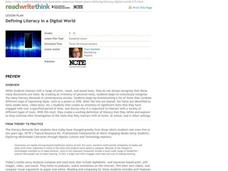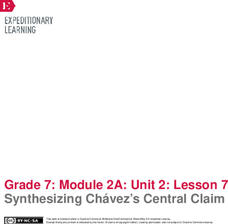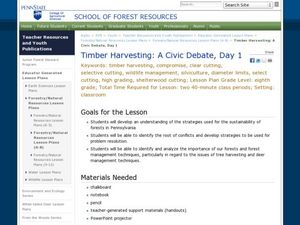Channel Islands Film
Restoration Channel Islands Debate
Introduce learners to the debate format with an activity that uses the National Park Service's controversial Channel Islands restoration program as a topic. Class members learn how to generate provocative debate questions, how to prepare...
University of Minnesota
Beautiful Brain: Brain Inspiration
"Neuroscientists consider Cajal as important to their discipline as Einstein is to physics." The first of four lessons has scholars view Santiago Ramon y Cajal's drawings of neurons. They reflect and respond to the art through writing...
ReadWriteThink
Defining Literacy in a Digital World
What skills are necessary to interact with different types of text? Twenty-first century learners live in a digital world and must develop a whole new set of skills to develop media literacy. Class members engage in a series of...
American Psychological Association
Counting Fidgets: Teaching the Complexity of Naturalistic Observation
Why do psychologists conduct experiments in controlled laboratory settings? High schoolers gain an understanding of the importance of controls with an activity that involves naturalistic observations with no imposed controls.
Nuffield Foundation
Enzyme-Catalysed Synthesis
Enzymes: not just for breaking chemicals apart. Young biologists perform an experiment on potatoes. They first remove starch from potato extract. They then add the resulting liquid to samples of glucose-1-phosphate, glucose, maltose, and...
BrainPOP
World History Lesson Plan: Uncovering Essential Questions
Have you ever noticed a news story revolves around an essential question? Scholars research methods of reporting historical events. Working in groups, they use an interactive module to gather information on a historical topic, uncovering...
Center for Instruction, Technology, & Innovation
Did African American Lives Improve After Slavery?
The Civil War made slavery illegal, but all ex-slaves were not totally free. Scholars visit eight different classroom stations to uncover life during the Reconstruction Era in America. Groups discover items such as Black Codes, 13th,...
Meadows Center for Preventing Educational Risk, University of Texas at Austin
Lesson 12 - Ed Suffix with Unchanging Base Words
Understanding different verb tenses begins with knowing how to decode words. A lesson on the -ed suffix with unchanging base words introduces readers to the past tense. Teachers present the skill with oral reading and spelling...
Meadows Center for Preventing Educational Risk, University of Texas at Austin
Lesson 7 - Letter Combinations
Individually, letters have their own sounds, but when combined with other letters, those sounds completely change. Introduce letter combinations with a lesson that asks learners to search for combinations in familiar words and use oral...
Acoustical Society of America
Good Vibrations
Visualize vibrations within the classroom. Pupils see the connection between sound and waves. The learners use a tuning fork in two different ways to demonstrate the waves associated with sound. Scholars see how the sound waves from a...
EngageNY
Synthesizing Chávez’s Central Claim
Class members play an interactive game, matching strips of paper containing rhetorical devices with examples from César Chávez use rhetoric in his 1984 speech, "Address to the Commonwealth Club of California." Next, partners discuss...
EngageNY
Identifying Main Ideas and Supporting Details: What’s Going On in the Teenage Brain?
What's going on in the teen brain? Pupils consider the question as they continue reading an informational article about the topic. While reading, they use a Thinking Log worksheet and an anchor chart to track their understanding of...
Nemours KidsHealth
Sportsmanship: Grades 9-12
The increasing number of unsportsmanlike conduct penalties, red cards, and ejections from games points out the need for activities that help young people recognize behaviors that exemplify good sportsmanship. For homework, class members...
Nemours KidsHealth
Conflict Resolution: Grades 9-12
Conflicts happen. Learning to deal with them positively, manage anger, and communicate feelings is the focus of a lesson that gives high schoolers the tools they need for conflict resolution. After reading a series of related articles,...
EngageNY
Mid-Unit Assessment and Establishing a Context for My Hero’s Journey Narrative
How do writers engage their readers in a story? Pupils consider the question and use the informational text, "The Hero's Journey" to justify their plan for their own fictional narrative. To that end, scholars write an explanatory...
EngageNY
Carl Hiaasen’s Perspective of Florida: Part 1
Share some tips. Scholars read Five Creative Tips from Carl Hiaasen to determine the gist. They think-pair-share their ideas about the text with a partner and then focus on challenging words and answer text-dependent questions.
EngageNY
Mid-Unit 3 Assessment: On-Demand Note-Taking about Howler Monkeys
Get the facts straight. Scholars complete their mid-unit assessment by reading a text, watching a video, and observing a picture about howler monkeys. They take notes about the facts they discover to use in future lessons.
American Institute of Physics
Historical Detective: Edward Alexander Bouchet and the Washington-Du Bois Debate over African-American Education
Young scientists meet Edward Alexander Bouchet who, in 1876, was the first African American to receive a PhD in Physics. This two-part lesson first looks at the debate between Booker T. Washington and W.E.B. Du Bois about the type of...
Curated OER
Drawing the Line at Freedom?
Students explore civil liberties as they relate to the events of September 11, 2001 and the months that followed, and discuss how these circumstances may or may not have altered the rights of American citizens and foreigners visiting the...
Curated OER
The Artist As Entrepreneur: Getting Down To Business: Get Organized
Students examine the various business structures and select the best one to use in a art business plan that they have developed. They compare the benefits and risks of each business structure then discuss in small groups the merits of...
Curated OER
Timber Harvesting: A Civic Debate, Day 1
Eighth graders develop an understanding of the strategies used in the sustainability of forests. In this timber harvesting lesson students identify and analyze the importance of forests and their management techniques.
Curated OER
Timber Harvesting: A Civic Debate
Eighth graders analyze and identify the importance of our forests and how to manage them properly. In this tree instructional activity students read forestry material and come up with different alternatives to the identified...
Curated OER
Mock Trial, A Service Activity
Students present a courtroom simulation demonstrating common good, decision making model, opportunity cost, limited resources, pursuit of happiness and civic writing.
Curated OER
The U.S. Constitution Power Grab Game
Students study the powers and limitations of the three branches of the American government. They explain how the system of "checks and balances" protects the individual citizens. They explain how the amendments to the Constitution...
Other popular searches
- Calculus Limits
- Pre Calculus Limits
- Limits and Continuity
- Pre Calculus With Limits
- Legal Limits
- Limits on Populations
- Functions and Limits
- Limits to Population Growth
- Limits Composite Functions
- Sexual Limits
- Constitutional Limits
- Pre Calculus Limits

























